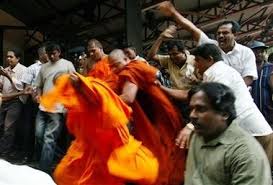
Most Westerners are familiar with the basic tenets of Buddhism. Few understand that there’s a popular religious movement that seeks to achieve the exact opposite of those tenets, and this movement is sweeping the Western World. It’s called anti-Buddhism, and most practitioners of it don’t even know it’s their religion.
The tenets of anti-Buddhism are essentially the mirror opposite of regular Buddhism. Where a Buddhist will try and make himself satisfied with his lot, thereby decreasing his desires for material pleasure, an anti-Buddhist will try and make himself less satisfied.
The anti-Buddhist will search through every part of his mind, conscious or unconscious, looking for misery. He will ruminate for hours on the most trivial of insults, grinding his teeth at the effrontery, and entertain the most ludicrous revenge fantasies. The tiniest of unfulfilled desires is justification enough to rage at the injustice of the world.
Where the Buddhist cultivates an aura of peace, the anti-Buddhist cultivates one of hatred. The entire world of phenomena is seen through this blood-red lens. As a consequence, everything in the whole world is worthy of contempt. The anti-Buddhist can have no real friends, just temporary alliances founded upon mutual hatred of an other.
And so, nothing is ever good enough for him. The most fortuitous event is not considered a blessing but rather him getting restitution for prior injustices, meaning that no gratitude is necessary. He simply moves straight on to fulfilling the next desire.
Like the Taoist, the Buddhist strives to live a simple life. He recognises that material possessions are just objects that ultimately end up possessing him, because they demand that time and energy be sacrificed to their maintenance and protection. The result of this simple life is the sense of peace and freedom that comes from not having to stress out about defending your wealth.
The anti-Buddhist rejects this line of reasoning as that of a weakling. The value of his life is a direct function of the resources and territory that he controls, and only through the maximum amount of stress and misery can the true value of his life be reached. Indeed, it’s vital that everyone around the anti-Buddhist sees and knows about his suffering, so that they can feel the awe that is the natural response to being around someone so great.
So where the Buddhist greets his fellows with a gentle smile and a reassuring word, the anti-Buddhist scowls and immediately starts going on about his health problems, or the need to exterminate some group of people he hates, because his capacity to cause fear in other people gives him a sense of power that he mistakes for being a worthwhile person.
If there’s one thing that really distinguishes the Buddhist from the followers of other practices, it’s meditation. Through meditation a person can get to genuinely know themselves and the ebbing and flowing of desires within their own mind. Paying attention to how their own mind works, they learn to distinguish genuine desires from conditioned ones and so learn to direct their energy to things that make them happy.
Correspondingly, meditation is the one thing that the anti-Buddhist avoids at any cost. Every millisecond of every day has to be crammed full of as much stimulation as possible, lest one inadvertently catch a few moments of meditation and accidentally become happier. There can be no such thing as rest, no such thing as peace. All efforts have to be devoted to the ceaseless acquisition of capital, because to pause for a moment is to risk slipping back down the dominance hierarchy.
Anti-Buddhism is widespread in our society, but it appears to be falling into decline. We have been so wealthy and yet so miserable for so long, that it’s no longer deniable that anti-Buddhism has failed to bring us any improvement to the quality of lives. Perhaps it’s time to return to the original spiritual practices?
*
If you enjoyed reading this essay, you can get a compilation of the Best VJMP Essays and Articles of 2017 from Amazon for Kindle or Amazon for CreateSpace (for international readers), or TradeMe (for Kiwis).

This is fascinating. I have met a few anti-Buddhist-Buddhists. And I sometimes wonder if anti-Buddhism is implicit in Buddhism. If you practise analytic meditation on grisly aspects of life, and focus on some of the atheistic aspects of Buddhism, you can be a kind of “misery Buddhist”. I once knew a tremendously violent, kind of like intellectually psychopathic man who considered himself to be a Zen Buddhist. He would take every opportunity possible to create upset and misery. I think his central theory was that the more you suffer, the more you know about reality, the more you recognise that the 1st noble truth of Buddhism is real, rather than say the tenets of seeking happiness. And together with this, he rejected rebirth as a kind of fantasy, but would consider these morbid things fascinating. He would say that in Zen Japan, there were monastaries where they’d say “if you meet Buddha in the road kill him”. The way he said that was very unnerving since back then I had real faith in Buddhism. Maybe by dependant co-arising Buddhists are locked into a relationship with those who walk in samsara in self-inflicted misery as this is considered sin, in Buddhism. (Something my friend would never have acknowledged).